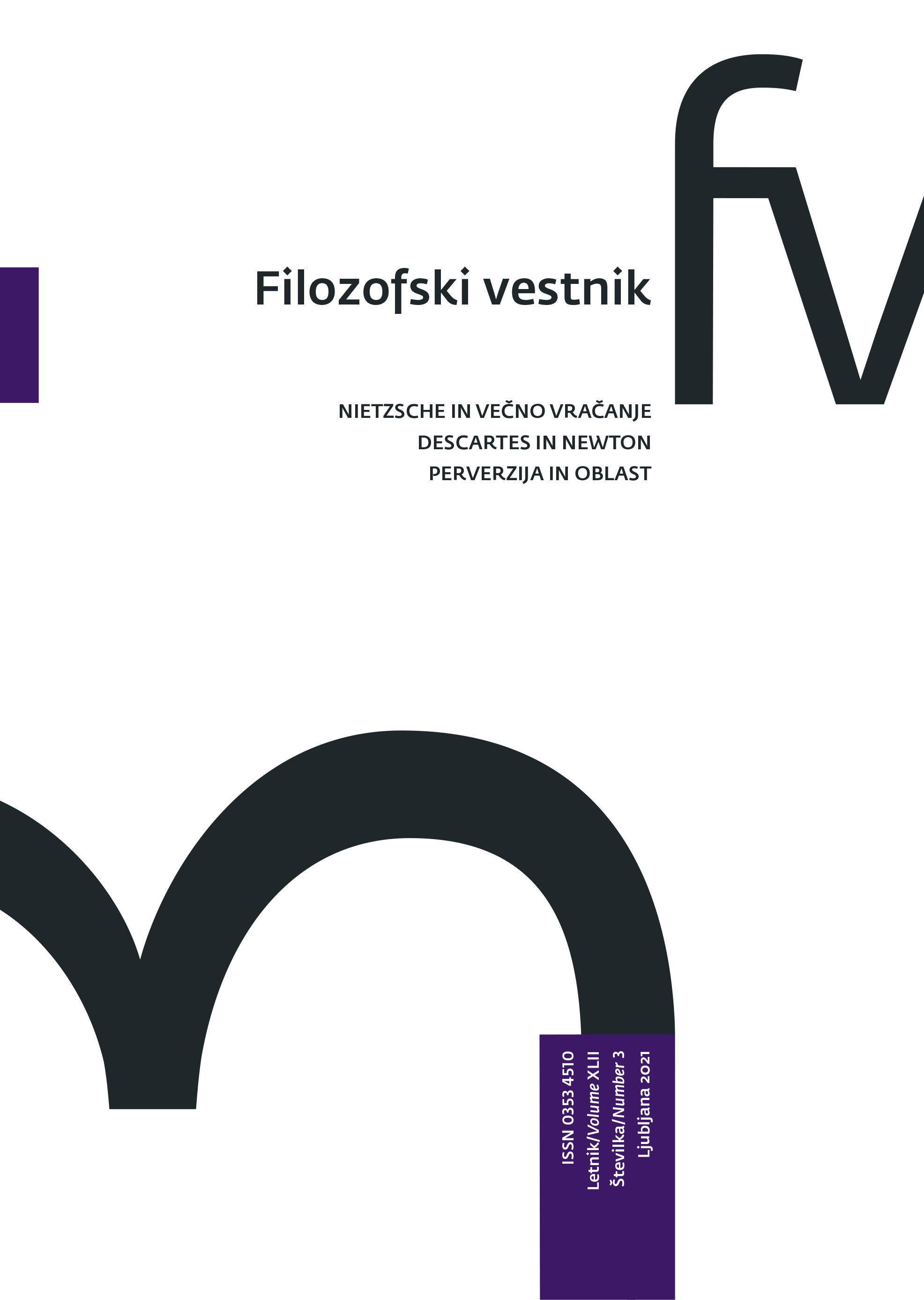Newton’s Criticism of Descartes’s Concept of Motion
DOI:
https://doi.org/10.3986/fv.42.3.07Keywords:
Newton, Descartes, definition of motion, body, force, absolute spaceAbstract
The author argues that Newton’s distinction between absolute and relative motion, i.e. the refusal to define motion in relation to sensible things, in “Scholium on time, space, place and motion” from Mathematical Principles of Natural Philosophy, stems in great part from his critical stance towards Descartes’s philosophy of nature. This is apparent from the comparison of “Scholium”, in which Descartes is not mentioned at all, with Newton’s criticism of him in his manuscript De gravitatione. The positive results of Newton’s encounter with Descartes’s theory of motion is almost completely identical to those of the “Scholium”: the definition of motion must concern the whole body and not just its surface; instead of “mutual translation”, it must include the force that is the cause of the physical motion; the motion of the bodies is uniform and straightforward, which can only be achieved within absolute space. As far as the theory of motion is concerned, Newton’s philosophical challenge was always Descartes.
Downloads
References
Anderson, Wallace, »Cartesian Motion«, v P. Machamer in R. Turnbull (ur.), Motion and Time, Space and Matter: Interrelations in the History of Philosophy and Science, Columbus, Ohio State University, 1976, str. 200–223.
Barbour, Julian, Absolute or Relative Motion? Volume 1: The Discovery of Dynamics, Cambridge, Cambridge University Press, 1989; ponatis kot The Discovery of Dynamics: A Study from a Machian Point of View of the Discovery and the Structure of Dynamical Theories, Oxford, Oxford University Press, 2001.
Des Chene, Dennis, Physiologia: Natural Philosophy in Late Aristotelian and Cartesian Thought, Ithaca, Cornell University Press, 1996.
Descartes, René, Principi filozofije: Drugi del, 1–44, prev. M. Hriberšek, Filozofski vestnik, 39 (1/2018), str. 35–65.
Gabbey, Alan, »New Doctrines of Motion«, v D. Garber in M. Ayers (ur.), The Cambridge History of Seventeenth-Century Philosophy, Cambridge, Cambridge University Press, 1998, str. 649–679.
Garber, Daniel, Descartes’ Metaphysical Physics, Chicago, University of Chicago Press, 1992.
Howard Stein, »Newtonian Space-Time«, Texas Quarterly, 10 (1967), str. 174–200; ponatis v R. Palter (ur.), The Annus Mirabilis of Sir Isaac Newton, 1666-1966, Cambridge, MIT Press, 1970, str. 358–284.
Huggett, Nick, »What Did Newton Mean by ‘Absolute Motion’?«, v A. Janiak in E. Schliesser (ur.), Interpreting Newton: Critical Essays, Cambridge, Cambridge University Press, 2012, str. 196–218.
Janiak, Andrew (2008), Newton as Philosopher, Cambridge, Cambridge University Press, 2008.
Janiak, Andrew (2013), »Metaphysics and Natural Philosophy in Descartes and Newton«, Foundations of Science, 18 (2013), str. 403–417.
Janiak, Andrew (2017), »Natural Philosophy«, v D. Kaufman (ur.), Routledge Companion to Seventeenth Century Philosophy, London, Routledge, 2017, str. 385–409.
Newton, Isaac, Isaac Newton's Philosophiae Naturalis Principia Mathematica, tretja izdaja (1726) z različicami besedil, zbrala in uredila A. Koyré in B. Cohen s pomočjo A. Whitman, dva zvezka s kontinuirano paginacijo, Cambridge, Harvard University Press, 1972.
Newton, Isaac, »De gravitatione/O težkosti«, v isti, Izbrani spisi 1, prev. M. Hriberšek in M. Vesel, Ljubljana, Založba ZRC, 2020, str. 81–143.
Newton, Isaac, Matematični principi filozofije narave: kratek izbor, prev. M. Hriberšek, Filozofski vestnik, 41 (3/2020), str. 7–79.
Palter, Robert, »Saving Newton's Text: Documents, Readers, and the Way of the World«, Studies in History and Philosophy of Science, 17 (4/1987), str. 385–439.
Rynasiewicz, Robert, »By Their Properties, Causes and Effects: Newton’s Scholium on Time, Space, Place and Motion, Part I: The Text«, Studies in History and Philosophy of Science, 26 (1/1995), str. 133–153.
Rynasiewicz, Robert, »By Their Properties, Causes and Effects: Newton’s Scholium on Time, Space, Place and Motion, Part II: The Context«, Studies in History and Philosophy of Science, 26 (2/1995), str. 295–321.
Sowaal, Alice, »Idealism and Cartesian Motion«, v A. Nelson (ur.), A Companion to Rationalism, Padstow, Wiley-Blackwell, 2005, str. 250–261.
Vesel, Matjaž, »Descartes o gibanju v Svetu«, Filozofski vestnik, 39 (1/2018), str. 7–34.
Vesel, Matjaž, »Newton, nedosegljivo bistvo teles, teološki voluntarizem in zakoni narave «, Filozofski vestnik, 41 (3/2020), str. 81–107.
Vesel, Matjaž, »Newtonova zgodnja dela: narava svetlobe in barv, teorija materije in filozofski obračun z Descartesom«, v Isaac Newton, Izbrani spisi 1, Založba ZRC, Ljubljana 2020, str. 167–230.
Vesel, Matjaž, »Newton's Genesis«: A Thought Experiment on the Creation of 'Bodies' and Its Epistemological Consequences«, v B. Vezjak (ur.), Philosophical Imagination: Thought Experiments and Arguments in Antiquity, Newcastle-upon-Tyne, Cambridge Scholars Publishing, 2021, str. 147–170.
Downloads
Published
Versions
- 2022-04-06 (2)
- 2021-12-31 (1)
How to Cite
Issue
Section
License
Copyright (c) 2021 Authors

This work is licensed under a Creative Commons Attribution-NonCommercial-NoDerivatives 4.0 International License.
Authors guarantee that the work is their own original creation and does not infringe any statutory or common-law copyright or any proprietary right of any third party. In case of claims by third parties, authors commit their self to defend the interests of the publisher, and shall cover any potential costs.
More in: Submission chapter





